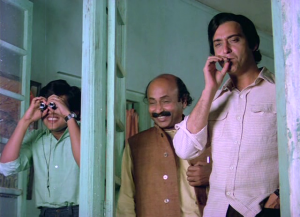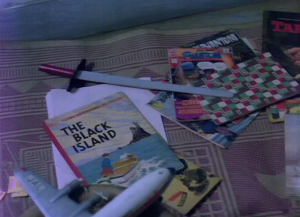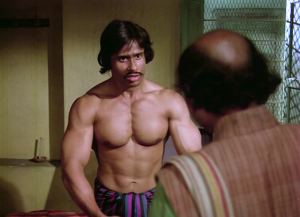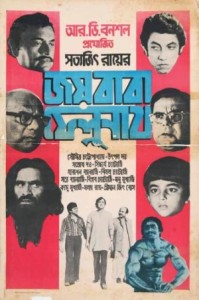Joi Baba Felunath: The Elephant God (Satyajit Ray, India, 1979, 112 min)
UW Cinematheque, Fri Feb 28, 7pm»
A detective, a writer, and a bodybuilder…
You might expect a “walk-into-a-bar” kind of joke to follow from this combination, but fortunately it’s a more pleasant humor offered by this week’s installment in the UW Cinematheque’s “Treasures from the Academy Film Archive” series.
Joi Baba Felunath: The Elephant God, written and directed by the great Satyajit Ray, is the kind of diverting tale of detection that I would have loved as a boy, and that is equally charming to me as an adult. Based on Ray’s own series of novels/stories, the movie is the second to feature his master sleuth Feluda, but don’t worry—it isn’t necessary to have seen the first film either to understand or take pleasure in the events of this one.
 While vacationing in the city of Benares, Feluda, aka Prodosh Mitra (played by Shoumitra Chatterjee) and his companions—his cousin Topshe (Siddartha Chatterjee) and his friend, the writer Jatayu (Santosh Dutta)—are asked by a local family to investigate the theft of a small yet highly valuable icon of Ganesh (the titular Elephant God). The investigation brings them into contact with the villainous Maganlal Meghraj (Utpal Dutt), who recently made an attempt to acquire the piece in question. As the detective digs deeper into his list of possible culprits, he suspects that it may not have been just a simple theft after all.
While vacationing in the city of Benares, Feluda, aka Prodosh Mitra (played by Shoumitra Chatterjee) and his companions—his cousin Topshe (Siddartha Chatterjee) and his friend, the writer Jatayu (Santosh Dutta)—are asked by a local family to investigate the theft of a small yet highly valuable icon of Ganesh (the titular Elephant God). The investigation brings them into contact with the villainous Maganlal Meghraj (Utpal Dutt), who recently made an attempt to acquire the piece in question. As the detective digs deeper into his list of possible culprits, he suspects that it may not have been just a simple theft after all.
The movie showcases many of the components of classic detective stories: a brilliant investigator who doesn’t mince words, his sidekicks that often provide comic relief, a sly and smiling villain, not to mention disguises, deduction, and surprises around every corner. A “Bengali Sherlock Holmes,” Feluda moves every bit as deliberately as the film is paced, playing his cards very close to the chest. As he and his companions go to the different areas of the city, we are treated to some beautiful cinematography (especially of the Ganges), as well as prevalent combinations of green and pink pastels in the interiors, which make for a number of eye-catching shots.
 As much as I like the leisurely machinations of the plot, and as marvelous as the resolution is, I equally enjoy the film’s reflexive qualities, particularly in the way it prizes the emotional truth of fiction. One of the key characters in the movie is a small boy, and there are several scenes in which we view the world through his eyes, a world that is built largely around adventure fiction (among others, Tarzan, Tintin, Batman, and The Phantom are all seen in the boy’s “secret hideout”). A story’s reliability, the way it can help interpret the facts of the world, the tricks it can play—the value of art as an influence on our own worldview is by no means conceptually complex, but nevertheless carries fundamental and lasting appeal, perhaps especially to younger viewers.
As much as I like the leisurely machinations of the plot, and as marvelous as the resolution is, I equally enjoy the film’s reflexive qualities, particularly in the way it prizes the emotional truth of fiction. One of the key characters in the movie is a small boy, and there are several scenes in which we view the world through his eyes, a world that is built largely around adventure fiction (among others, Tarzan, Tintin, Batman, and The Phantom are all seen in the boy’s “secret hideout”). A story’s reliability, the way it can help interpret the facts of the world, the tricks it can play—the value of art as an influence on our own worldview is by no means conceptually complex, but nevertheless carries fundamental and lasting appeal, perhaps especially to younger viewers.
 This was the other surprise for me; it is a far more “all-ages” film than I had anticipated. Ray provides the audience here with light entertainment in the very best sense. While obviously (and happily) not without a good amount of danger, the overall tone is far more jovial than edgy. If this movie has a flaw, it would be the bodybuilder. It is not that he has too much screen time; quite the reverse, I wish there could have been one or two more scenes with him. His presence is so random and inexplicable amid the other events of the story, and yet that same presence brings comedy in each and every scene in which he plays a part.
This was the other surprise for me; it is a far more “all-ages” film than I had anticipated. Ray provides the audience here with light entertainment in the very best sense. While obviously (and happily) not without a good amount of danger, the overall tone is far more jovial than edgy. If this movie has a flaw, it would be the bodybuilder. It is not that he has too much screen time; quite the reverse, I wish there could have been one or two more scenes with him. His presence is so random and inexplicable amid the other events of the story, and yet that same presence brings comedy in each and every scene in which he plays a part.
While Ray’s Feluda printed exploits were published in omnibus format by Penguin about 10 years ago, a good quality version of this film is not the easiest to see. So, if you like a good mystery, be sure to attend tomorrow night’s screening of what will be sure to be a beautiful 35mm print, newly restored by the Academy Film Archive.
